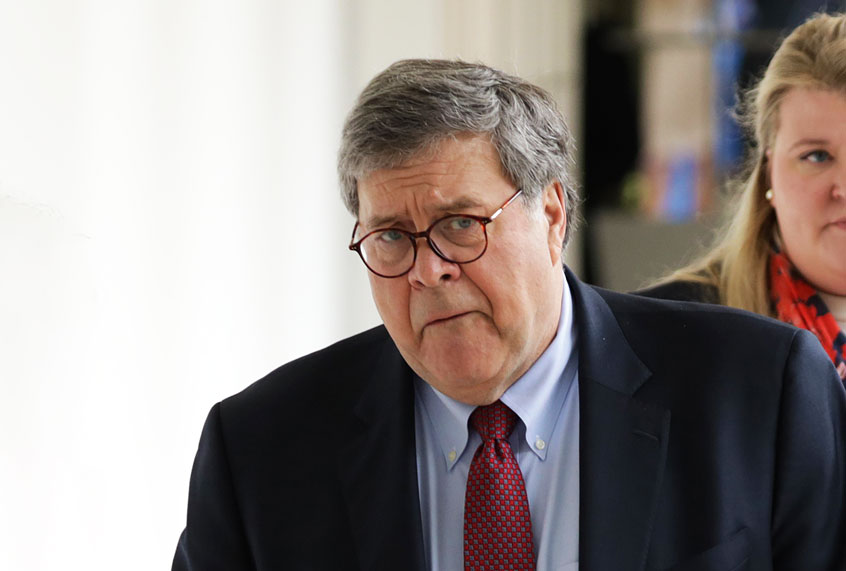Attorney General William Barr is expected to attack Democrats and the Department of Justice’s own investigation into the 2016 Trump campaign’s ties to Russia during his first appearance Tuesday before the House Judiciary Committee.
Barr is scheduled to testify before Rep. Jerry Nadler’s, D-N.Y., panel after numerous delays and subpoena threats. The attorney general is set to accuse Democrats of seeking to discredit him and defend his controversial moves since taking office, according to his prepared opening remarks released on Monday.
“Ever since I made it clear that I was going to do everything I could to get to the bottom of the grave abuses involved in the bogus ‘Russiagate scandal,’ many of the Democrats on this committee have attempted to discredit me by conjuring up a narrative that I am simply the president’s factotum, who disposes of criminal cases according to his instructions,” Barr says in the opening statement. “Judging from the letter inviting me to this hearing, that appears to be your agenda today.”
Barr is likely to be grilled on a wide-ranging number of issues, including the federal deployment to cities like Portland and Chicago; his role in the tear-gassing of peaceful protesters ahead of President Donald Trump’s church photo-op; his decision to fire Southern District of New York U.S. Attorney Geoffrey Berman; his intervention into the cases of former Trump advisers Roger Stone and Michael Flynn; and the alleged politicization of the Justice Department.
“The president has not attempted to interfere in these decisions,” Barr says in the prepared remarks.
“From my experience, the president has played a role properly and traditionally played by presidents,” the remarks say, even though Trump has attacked the Justice Department on Twitter and demanded that it prosecute his enemies throughout his presidency. “The president has occasionally, and appropriately, confirmed that the department is aware of the matter. But the handling of the matter, and my decisions on criminal matters, have been left to my independent judgment.”
But as he seeks to downplay the president’s role in the decision-making process at the department, Barr says he views his role as fighting back against what he views as the politicization of the department against Trump.
“I became deeply troubled by what I perceived as the increasing use of the criminal justice process as a political weapon and the emergence of two separate standards of justice,” his statement says. “When asked to consider returning, I did so because I revere the department and believed my independence would allow me to help steer her back to her core mission of applying one standard of justice for everyone and enforcing the law even-handedly, without partisan considerations.”
Barr is also set to speak about the federal deployment in response to protests over the death of George Floyd and police brutality. He is expected to reject claims that the law enforcement system is racist and insist that the presence of federal authorities is warranted, even though officials in Oregon have said the deployment has escalated tensions after protests were already calming down.
“Until just the last 50 years or so, our laws and institutions were explicitly discriminatory,” Barr says in the statement, before claiming that everyone has been equal under the law since then despite numerous staggering documented racial disparities.
Barr cites the increase of Black police officers and says that events such as the killing of Floyd “are fortunately quite rare,” even though unarmed Black people are disproportionately more likely to be killed by police than white people.
“The number of unarmed Black men killed by police so far this year is eight. The number of unarmed white men killed by police over the same time period is 11,” Barr says in the statement, neglecting to mention that Black people make up 13% of the population while white people make up 60% of the population.
Though he acknowledges that concerns about racism in policing from the Black community are “legitimate,” he goes on to describe protests over Floyd’s death as violent, even though the overwhelming majority have been peaceful.
Barr complains about people “demonizing the police” and “irresponsible efforts to defund the police” as he points to the number of Black people killed by other Black people each year.
Barr describes a “breakdown in the rule of law” since Floyd’s death, citing “violent rioters and anarchists” that have “hijacked legitimate protests to wreak senseless havoc,” even as federal officers in Portland have been seen on footage tear-gassing peaceful moms and veterans who came out in support of demonstrators near a federal courthouse protected by federal forces.
“What unfolds nightly around the courthouse cannot reasonably be called a protest: it is, by any objective measure, an assault on the government of the United States,” he claims. “Largely absent from these scenes of destruction are even superficial attempts by the rioters to connect their actions to George Floyd’s death or any legitimate call for reform.”
Barr goes on to criticize the media for blaming the federal government over the response, even though the blame has come from Portland and Oregon’s own elected officials and police chief.
Democrats are ready to fire back at Barr ahead of his testimony, as well.
Rep. Eric Swalwell, D-Calif., a member of the Judiciary Committee, penned an op-ed in Newsweek on Monday casting Barr as the president’s “fixer.”
“Michael Cohen was Donald Trump’s fixer, until he got caught, pleaded guilty and went to prison. Now Bill Barr has taken the job,” Swalwell wrote. “Unfortunately, Bill Barr already had a job — as attorney general of the United States, our nation’s top law enforcement official. And we must not let him do both jobs at once.”

